Our grade 11 theme is childhood, but nowhere does it state whose childhood. So this year we read Patricia McCormick’s novel Sold, which chronicles the childhood, or more specifically the loss of childhood, in a young girl who is trafficked. A powerful story. This was the springboard into our unit on modern slavery and creating a social media campaign. — Shelley Wright, Life in a Twenty-First Century Classroom
This is not your grandmother’s English classroom.
Shelley Wright, more than other English teacher I know or know of, has succeeded in designing a literacies-based model of teaching literature in an interdisciplinary, authentic, real-world way. As she writes in this powerful blog post, teaching English isn’t about teaching novels anymore. It’s about inquiry, project-based learning informed by literature and served by technology. Wright refers to it as skills-based but I think learning to research, filter, curate, create and produce multimodal, media presentations of what’s learned are really literacies. As Oliver, our teen fanfiction writer guest speaker reasoned, “literacy is competency,” and twenty-first century learning requires new competencies to be successful.
What is literacy? What is literature? We’ve only begun the discussion . . .
This week, Week 3 (could that be right?) will bring our second Collaborative Critical Inquiry (CCI) and our first peer-led and peer-designed one. Remember that the basic steps include framing a compelling question, unpacking it to find scaffolding questions, researching to find resources that help us explore those questions and organizing these in some activity that prepares us for the discussion in class (which is also peer-led and can follow any strategy/format you’d like), and then individuals engage in critical reflection at the week’s end. Now, if some real action could naturally flow from a CCI — that would be awesome!
Please do include me in the planning. I’m happy to collaborate.
Finally, this point person/leader for each CCI (the first two for us/adults and the final one for students) will complete a survey recognizing each member for their contributions. And each member will complete the survey reflecting on their contribution.
Community Charter is ready for any additions that you think important. I’ve created a draft assessment survey based on what I’ve added to the Charter and will edit the assessment survey to reflect any changes. Please take a look and let me know of any additions/changes so it is clear to all as you begin your work together.
Enjoy your collaboration!

Leave a comment